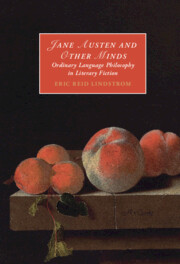Book contents
- Jane Austen and Other Minds
- Cambridge Studies in Romanticism
- Jane Austen and Other Minds
- Copyright page
- Contents
- Acknowledgments
- Abbreviations
- Introduction
- Chapter 1 Austen and Austin
- Chapter 2 Intelligible Community
- Chapter 3 Sense and Sensibility and Suffering
- Chapter 4 Pride and Prejudice and the Comedy of Perfectionism
- Chapter 5 Perlocutionary Entailments
- Chapter 6 Emma and Other Minds
- Chapter 7 Persuasion, Conviction, and Care Jane Austen’s Keeping
- Notes
- Bibliography
- Index
- Cambridge Studies in Romanticism
Chapter 4 - Pride and Prejudice and the Comedy of Perfectionism
Published online by Cambridge University Press: 04 November 2022
- Jane Austen and Other Minds
- Cambridge Studies in Romanticism
- Jane Austen and Other Minds
- Copyright page
- Contents
- Acknowledgments
- Abbreviations
- Introduction
- Chapter 1 Austen and Austin
- Chapter 2 Intelligible Community
- Chapter 3 Sense and Sensibility and Suffering
- Chapter 4 Pride and Prejudice and the Comedy of Perfectionism
- Chapter 5 Perlocutionary Entailments
- Chapter 6 Emma and Other Minds
- Chapter 7 Persuasion, Conviction, and Care Jane Austen’s Keeping
- Notes
- Bibliography
- Index
- Cambridge Studies in Romanticism
Summary
Chapter 4 interprets Austen’s beloved comedy of marriage in dialogue with Cavell’s philosophy of comic remarriage. In its first half I consider the charismatic art of Pride and Prejudice as a form of the conversational “sequel,” as Pride and Prejudice the cultural phenomenon comprises an unbounded event of uncontainable circulation and exchange. The chapter’s second half gives visibility to Cavell’s omission of the genealogy of the European concept of perfectibility from his Emersonian inflection of moral perfectionism. Cavell has never explicitly laid out or paid homage to the trajectory, tensions, and implications of perfectibility as a concept found in European philosophy and literature of the Enlightenment. The omission impacts a Cavellian reading of Pride and Prejudice by laying new stress on how Austen uses comic style to articulate her own fictional stance against the disembodiment and rhetorical rigidity of much thinking on “perfectibility” – especially Godwin’s. At the center of Jane Austen and Other Minds, the chapter enacts a hinge-movement regarding philosophy’s historical and material conditions and gender as topics of emergent interest in late Cavell.
Keywords
- Type
- Chapter
- Information
- Jane Austen and Other MindsOrdinary Language Philosophy in Literary Fiction, pp. 96 - 130Publisher: Cambridge University PressPrint publication year: 2022

